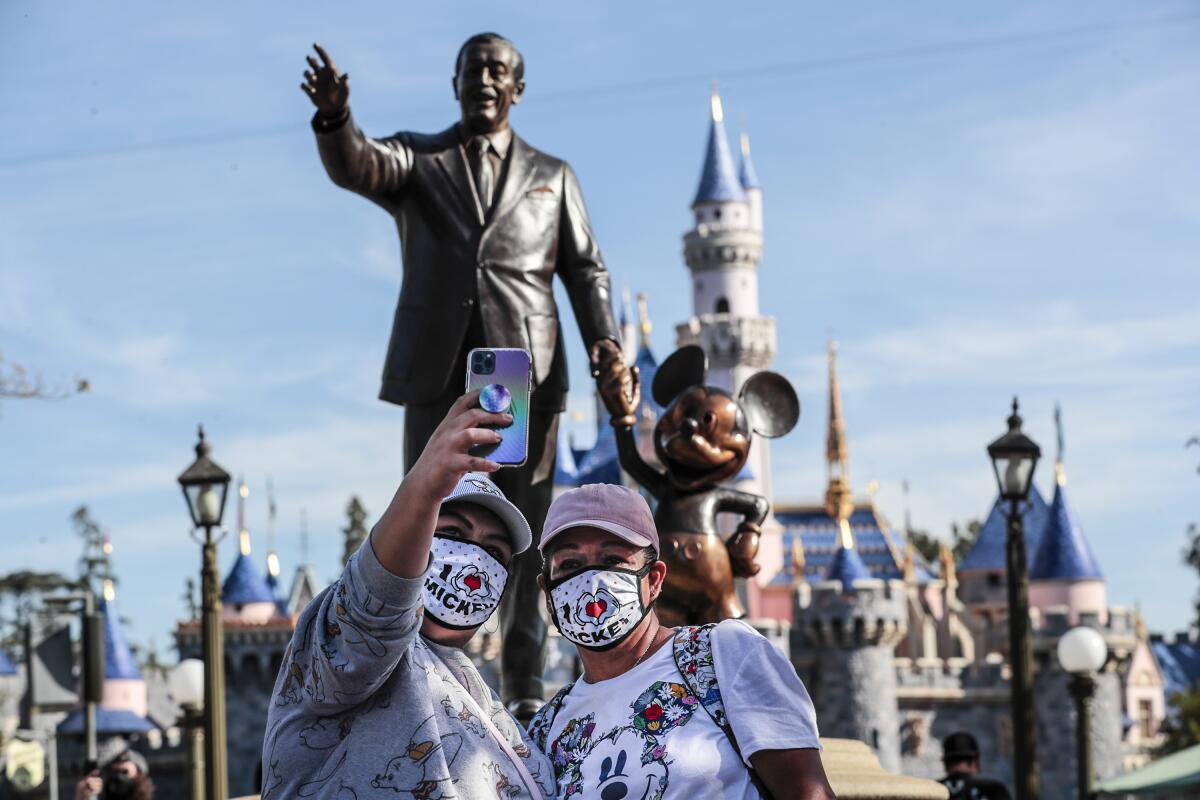Disney parks swing to a profit and Disney+ hits 116 million subscribers

- Share via
Walt Disney Co. swung to a profit in the third fiscal quarter, with improved results at its key parks and products division helping the entertainment colossus beat earnings estimates on Wall Street on Thursday.
Disney’s streaming business continued to grow, with Disney+ reaching 116 million subscribers during the quarter, up from the 103.6 million the company reported in May.
Inside the business of entertainment
The Wide Shot brings you news, analysis and insights on everything from streaming wars to production — and what it all means for the future.
You may occasionally receive promotional content from the Los Angeles Times.
Burbank-based Disney reported revenue of $17 billion during the three months that ended July 3, up 45% from a year ago when the entertainment industry was in the throes of COVID-19 restrictions on theme parks and movie theaters. The results beat analyst estimates of $16.7 billion in revenue.
The quarterly profit for the company was $923 million, compared with a net loss of $4.7 billion in the prior-year quarter. Earnings of 80 cents a share were better than the 55 cents predicted by analysts polled by FactSet.
Parks continued to recover from pandemic doldrums in the quarter. Revenue for Disney’s parks, experiences and products segment — which includes Walt Disney World and Disneyland Resort — was $4.34 billion, up from $1.06 billion a year earlier.
Operating income in parks and experiences was $356 million, compared with a year-ago loss of $1.88 billion, the company said.
PLUS: Peacock gets eyeballs. But Olympics viewers are confused.
The pandemic resulted in the closure of theme parks around the world last year. Disneyland Resort in Anaheim reopened at the end of April and attendance improved at the park after California lifted COVID-19 restrictions on June 15, Chief Financial Officer Christine McCarthy said on a conference call with analysts.
Disney’s cruise business is also slowly returning to life. Last month, Disney completed its first cruise since the start of the pandemic with the Disney Magic sailing for short-term staycations for U.K. residents. This week, a Disney ship set sail on its first U.S.-based cruise from Florida.
Sales from Disney’s all-important direct-to-consumer business, composed of services such as Disney+, Hulu and ESPN+, increased 57% to $4.3 billion. The division, considered the company’s top priority, narrowed losses to $293 million, compared with about $624 million a year earlier.
Disney+ has grown quickly since its debut in November 2019. Its 116 million subscribers are more than double its count at the same time in 2020. Disney said increased subscription revenue and sales of “Cruella,” which was released to Disney+ for $30 at the same time as its theatrical launch, contributed to revenue growth.
Bob Chapek, chief executive of Disney, attributed the growth to hits such as Pixar’s film “Luca” and Marvel shows “Loki” and “The Falcon & the Winter Soldier.”
The majority of new subscribers came from Disney’s low-cost Disney+Hotstar service available in India and Indonesia. Disney+Hotstar now accounts for a little less than 40% of total Disney+ subscribers, McCarthy said.
Disney’s simultaneous release strategy, which was used for some movies during the pandemic, has been controversial. “Black Widow” star Scarlett Johansson recently sued Disney, saying the same-day video-on-demand release strategy cheated her out of income. Disney has said her claims are without merit.
Chapek did not specifically address the litigation on the call. However, he told analysts that the “Black Widow” release decision was made with Executive Chairman Bob Iger and other Disney executives “because it would enable us to reach the broadest possible audience” for the film.
Theater owners have blasted the decision, arguing that the simultaneous release ate into box office grosses.
But Chapek repeatedly noted that the box office market continues to be uncertain because of the pandemic and the Delta variant of the coronavirus causing audiences to hesitate before returning. Disney releases “Free Guy” this weekend, and it will have an exclusive 45-day window in theaters before hitting home video.
Asked why he wouldn’t switch to a same-day streaming strategy for “Free Guy,” Chapek said the Ryan Reynolds movie was acquired through Disney’s purchase of Fox assets and came with certain contractual agreements, whereas Disney has more freedom to change release plans for Marvel movies.
Marvel’s “Shang-Chi and the Legend of the Ten Rings” will also get a 45-day theatrical window in September. Chapek said the release of “Shang-Chi” would be an “interesting experiment.”
“The prospect of being able to take a Marvel title to the service after going theatrical with 45 days will be yet another data point to inform our actions going forward on our titles,” he said.
More to Read
Inside the business of entertainment
The Wide Shot brings you news, analysis and insights on everything from streaming wars to production — and what it all means for the future.
You may occasionally receive promotional content from the Los Angeles Times.












